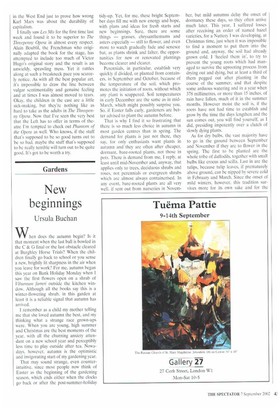New beginnings
Ursula Buchan
When does the autumn begin? Is it that moment when the last ball is bowled in the C & G final or the last obstacle cleared at Burghley Horse Trials? When the children finally go back to school or you sense a new, brightly lit sharpness in the air when you leave for work? For me, autumn began this year on Bank Holiday Monday when I saw the first flowers open on a shrub of Viburnum farreri outside the kitchen window. Although all the books say this is a winter-flowering shrub, in this garden at least it is a reliable signal that autumn has arrived.
I remember as a child my mother telling me that she loved autumn the best, and my thinking what a strange race grown-ups were. When you are young, high summer and Christmas are the best moments of the year, with all the churning anxiety attendant on a new school year and perceptibly less time to play outside after tea. Nowadays, however, autumn is the optimistic and invigorating start of my gardening year.
That may sound strange, even counterintuitive, since most people now think of Easter as the beginning of the gardening season, which ends either when the clocks go back or after the post-summer-holiday tidy-up. Yet, for me, these bright September days fill me with new energy and hope, with plans and ideas for fresh starts and new beginnings. Sure, there are some things — grasses, chrysanthemums and asters especially — still to flower, and even more to watch gradually fade and senesce but, as plants shrink and falter, the opportunities for new or renovated plantings become clearer and clearer.
Perennials, in particular, establish very quickly if divided, or planted from containers, in September and October, because of the temperature of the soil, which promotes the initiation of roots, without which any plant is scuppered. Soil temperatures in early December are the same as in midMarch, which might possibly surprise you. So, if Easter falls early, gardeners are better advised to plant the autumn before.
That is why I find it so frustrating that there is so much less choice in autumn in most garden centres than in spring. The demand for plants is just not there, they say, for only enthusiasts want plants in autumn and they are often after cheaper, dormant, bare-rooted plants, not those in pots. There is demand from me. I reply, at least until mid-November and, anyway, that applies only to trees, deciduous shrubs and roses, not perennials or evergreen shrubs which are almost always containerised. In any event, bare-rooted plants are all very well, if sent out from nurseries in Novem
ber, but mild autumns delay the onset of dormancy these days, so they often arrive much later. This year, I suffered losses after receiving an order of named hazel varieties, for a Nuttery I was developing, at Christmas time, just when it was impossible to find a moment to put them into the ground and, anyway, the soil had already grown cold. I 'heeled them in', to try to prevent the young roots which had managed to survive the uprooting process from drying out and dying, but at least a third of them pegged out after planting in the course of the summer, and that despite some arduous watering and in a year when 378 millimetres, or more than 15 inches, of rain have fallen, much of it in the summer months. However moist the soil is, if the roots have not had time to establish and grow by the time the days lengthen and the sun comes out, you will find yourself, as I did, presiding impotently over a clutch of slowly dying plants.
As for dry bulbs, the vast majority have to go in the ground between September and November if they are to flower in the spring. The first to he planted are the whole tribe of daffodils, together with small bulbs like crocus and scilla. Last in are the tulips, because tulip leaves, if prematurely above ground, can be nipped by severe cold in February and March. Since the onset of mild winters, however, this tradition survives more for its own sake and for the convenience of having something to do in late autumn.
Even if you have got to the stage in your life when you feel your garden no longer needs any new planting, thank you very much, this month remains the moment for the final, triumphal, harvest of garden produce: apples, pears, late plums, autumn raspberries, blackberries, potatoes, beans, tomatoes. There is so much to play for and, what is more, no time to be lost. September may be mild but the equinoctial gales towards the end of the month invariably cause trouble. In the words of the proverb which is really a prayer, 'September blow soft till the fruit's in the loft'.



























































 Previous page
Previous page